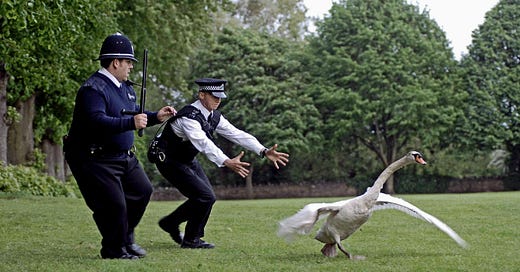Kindred hit by £7.1m UK fines
32Red and Platinum Gaming pay the penalty, Georgia gets on its soapbox, UK debates future of gambling +More
Good morning. On today’s agenda:
Kindred is fined for RG and AML failures with two of its brands.
A surprise legislative maneuver in Georgia is heavily criticized.
Well-rehearsed arguments are submitted to UK parliamentary inquiry.
Economic crime levy details revealed.
Facebook casino ads stump Aussie regulators.
Kindred fine
Kindred is hit with fines totaling £7.1m by the UK Gambling Commission for failures at 32Red and Platinum Gaming.
A series of failings with regard to social responsibility and AML procedures at Kindred’s 32Red and Platinum Gaming divisions has led to the UKGC levying fines of £4.1m and £3m respectively, as well as giving the company an official warning.
Prior warning: The quantum of the fine was prefigured by the company in its Q4 earnings.
Among the RG failures, the Commission said 32Red’s controls were not sufficient in identifying excessive play or potential harmful behavior, superficial customer interactions that “lacked depth and probing” and failures in self-exclusion policies across the two brands.
The AML failures included triggers being too high and “not appropriate” for effective AML and anti-terrorist customer risk management, and allowing customers to gamble while source of funds checklists were ongoing.
Kay Roberts, executive director at the Gambling Commission, said the failures “highlight clearly” that 32Red and Platinum Gaming failed to interact with customers in a way that “minimizes the risk of them experiencing harms associated with gambling”.
The UKGC investigations also showed that policies and procedures were “overlooked” both around customer accounts and anti-money laundering practices.
Awks: Kindred CEO Henrik Tjärnström said the company would redouble its efforts on its own “Journey Towards Zero ambition”. He said the company had increased its compliance department headcount as well as introducing further RG efforts, which include:
A bespoke approach to all customers under 25.
Full registration blocks for players who show signs of significant financial pressure.
Voluntarily imposition of stake limits on “certain products” depending on individual risk profiles. The continued roll-out of automated interventions to “ensure rapid reaction to any signs of escalating risk among players”.
** SPONSOR’S MESSAGE ** Tried, tested and proven over a decade in the highly-regulated US market, and continuing to expand across Europe, Latin America, Asia and Africa. GeoComply harnesses the power of its market-leading geolocation technology to protect against fraud, including fake account creations, bonus abuse, account takeovers, stolen identities, money laundering, and more. Visit geocomply.com.
Georgia sports-betting last gasp
A surprise legislative move is heavily criticized.
I am the resurrection: Multiple Georgia sports-betting bills failed to pass their house of origin by crossover day, seemingly ending the state’s 2023 efforts. However, one of those efforts has risen from the dead via some legislative maneuvering.
Get on your soapbox: A bill by a first-year legislator that promoted soapbox derbies has been commandeered by sports-betting supporters. HB 237 was amended to add 45 pages of sports-betting legislation to the two-page soapbox derby measure. The original sponsor later proposed an amendment to strip the soapbox derby language, which passed.
The seemingly sly move was heavily criticized.
“When you hijack a soapbox derby and put sports betting on the back of it, every person that was on the fence in the state of Georgia has just picked a side of the fence,” Sen. Mike Dugan said.
“It will not pass on the [Senate] floor, and I think everybody in here knows it won’t pass on the floor, and the damage you have just done to the sports-betting industry by trying this is unfathomable.”
On the move: Sports-betting bills in Kentucky, Missouri, North Carolina, Oklahoma and Minnesota are weaving their way through their respective legislatures.
Kentucky – Kentucky’s sports betting bill (HB 551) sailed through the House and has cleared its first committee in the Senate.
Missouri – The Missouri House has passed HB 556, which sends the legislation to the Senate, where last year’s efforts went up in smoke. Once again VLTs will be the point of contention.
North Carolina – North Carolina’s efforts to bring mobile betting to the state (HB 347) is progressing through the Finance and Judiciary committees on Wednesday.
Oklahoma – The House passed a sports-betting bill (HB 1027) allowing tribes to compact with the state to offer retail and/or online sports betting.
Minnesota – A bill that would bring retail and mobile betting, HF 2000, has passed two legislative committees and is now in the House State and Local Government Finance and Policy.
UK committee responses
All sides of the debate over the future of gambling in the UK got to air their views as part of a key UK parliamentary committee inquiry.
Opening positions: With the deadline for responses to the upcoming DCMS parliamentary committee inquiry into gambling having passed in late February, a total of 91 responses from operators, lobby groups, sports bodies, academics, consultants and a smattering of interested individuals gave their two cents worth.
The various voices in the UK gambling debate got to air once again their well-rehearsed arguments via their answers to five questions as set out late last year.
These covered the scale of gambling-related harm, the priorities of the upcoming White Paper, what exactly should be encompassed by the term ‘gambling’, the difficulties of the regulator keeping up with online innovation and offshore issues.
I contain multitudes: When the committee gets to hear oral evidence, it is clear the MPs will be hearing some familiar arguments. In the written evidence, many of the operators and their supporters parroted the party line that the scale of gambling-related harm continues to be “highly debated and complex”.
The opposition, meanwhile, went with the claims as submitted by Gambling With Lives that ”everyone is at risk of suffering gambling-related harm”.
The ego has landed: Derek Webb, founder and funder of the original anti-FOBT Campaign for Fairer Gambling, opened his submission by claiming – probably rightly – that machines legislation would “not have happened at that time but for my personal efforts”.
“The FOBT stake reduction is the single most effective harm reduction measure so far, but there has not yet been an official public assessment of that success,” he asserted.
List of demands: Optimistically, the operators presented their suggestions for the adoption of frictionless checks on affordability, the operations of the UKGC and warnings about the black market.
What we’re writing
The latest issue of The Pinchpoint discusses the changing language being used by ministers on the vexed issue of financial risk measurements and asks whether the loaded term ‘affordability’ will even feature.
Dirty money
Around 48 lucky casinos (Gambling Commission estimate) will begin handing over tens of thousands of pounds next week under the latest government wheeze to tackle dirty money.
Pass the hat: The stealth tax Economic Crime Levy was introduced in 2021, liability commenced in 2022 and as of April 1, 2023 collection of duty begins.
Casinos with a UK turnover exceeding £10.2m in a financial year are liable.
The levy applies from each financial year, but the turnover on which the charge is based is measured using the business’s period of accounting within the financial year.
Aside from casinos, other AML regulated entities such as law firms, crypto exchanges, art dealerships and banks will also be subject.
The aim is to raise £100m for the government coffers and funding of a new national financial intelligence team with a mandate dedicated to fighting money laundering.
🧐Economic crime levy
Stuck on repeat: Given firms already dedicate substantial time and money to comply with AML regulations, the levy has come in for criticism.
The Gambling Commission has made no announcement beyond a note buried in its priorities for the year.
It has also neglected to formally make public what a business is required to provide when notifying of its liability and what must be included in the return.
The Commission did not respond when approached for more details.
Why always us? Some legal experts have questioned the appropriateness of the fixed-fee element. Those just entering a band threshold will pay the same amount as other firms with much higher levels of turnover.
The rate does not take into account risk profiles and the payments are not deductible for corporation or income tax purposes.
Sources within the Commission said no decision had been made on whether it would make public the list of (approx 48 out of 186) businesses expected to pay the levy.
Facebook casino ads
Facebook is at the center of another row over black market operators using its platform to target punters, this time in Australia.
Banned, on the run: BitStarz, an online casino based in the Caribbean tax haven Curaçao, is still promoting to Australians via Facebook, despite multiple warnings that it is in breach of federal laws.
BitStarz was warned by Australian regulators in 2021 that it was providing a “prohibited interactive gambling service” by targeting Oz customers, in breach of federal law.
The casinos ads are still up, in spite of regulatory efforts to have them pulled, researchers have found.
Meta, the owner of the social media platform, said BitStarz is an “authorized gambling partner” and its policy requires those placing gambling ads to demonstrate that they are lawful in territories they want to target.
BitStarz’s parent company Dama N.V. operates many other online gambling services prohibited in Australia and has received 48 formal warnings for breaching the Interactive Gambling Act.
Where are you now? The ACMA declined to comment on the recent case, but said it can only target publishers if it is satisfied that most people who access the content are “physically present in Australia”.
“This potentially limits the reach of the prohibition to exclude some websites accessible by Australians, including websites that have a global audience such as Facebook”, an ACMA spokesperson said.
Lawyers and academics in Australia have questioned how Meta allowed the ads to slip through and whether Facebook should also be held liable for publishing unlawful material.
Check your wallet: UK authorities have been more successful in targeting unlicensed activity on Facebook.
As previously reported in C+M, the UK Gambling Commission issues a cease and desist notice and if no response is forthcoming payment providers are blocked.
Last year’s Gambling Commission enforcement report noted a large rise in illegal lottery numbers on social media.
Facebook was far and away the biggest culprit, with the GC noting that lotteries on the social networking site are “evolving in volume and complexity”.
** SPONSOR’S MESSAGE ** Odds On Compliance is a technology and consultancy firm specializing in sports betting, iGaming, gambling compliance, and regulatory frameworks. We assist in navigating and staying up-to-date with rapidly developing regulatory compliance frameworks at state and federal levels. Our flagship product Playbook features carefully curated and updated statutes, regulations, and requirements enabling businesses to stay in step with the regulatory agencies. Visit www.oddsoncompliance.com.
Newslines
Sportradar’s Integrity Services unit reported 1,212 suspicious matches last year, a 34% increase on 2021. The company monitored 850,000 matches in more than 70 sports.
Johnny guitar: The planned guitar-shaped hotel on the Las Vegas Strip that Hard Rock is planning at The Mirage got the green-light from the Clark County Commission, according to Las Vegas Review-Journal.
An +More Media publication.
For sponsorship inquiries email scott@andmore.media.












